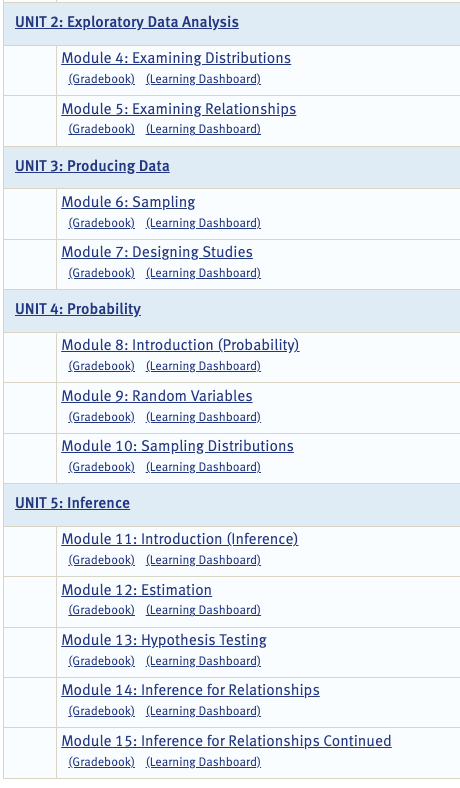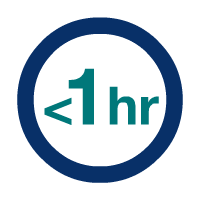Statistical Reasoning Online Module
What is it and how does it work?
Statistical Reasoning is an introductory statistics course offered through the Open Learning Initiative (OLI). It is designed to teach the basic concepts of statistics and the logic of statistical reasoning. The only prerequisite is basic algebra. Although students work through the course independently, it includes many interactive elements including simulations, “walk-throughs” that integrate voice and graphics to explain an example of a procedure or a difficult concept, and, most prominently, computer tutors in which students practice problem solving, with hints and immediate feedback.
NOTE: The probability unit of the Statistical Reasoning course functions as a “bridge” to the inference section and includes only those concepts necessary to support a conceptual understanding of the role of probability as the “machinery” behind inference. For educators who are looking for a resource that addresses probability in greater depth, please see the Probability and Statistics OLI course.
Which skill(s) are targeted?
- Identify, define, and navigate the data and information landscape
- Critically evaluate data and information
- Analyze data and engage with information in and across communities of practice
Who else has used it?
- CMU’s Statistics and Data Science instructors have used this online course as an interactive textbook (instead of a traditional textbook) and homework resource for various introductory statistics courses in their undergraduate curriculum.
- CMU’s Human-Computer Interaction Institute and Psychology Department have assigned this online course as a pre-matriculation activity for some of their programs’ graduate students to complete before beginning their program of study – i.e., as a “bridge” course that helps students enter the program with foundational statistics knowledge and skills.
- Various CMU instructors have made this online course available to students in their intermediate-level undergraduate statistics and research methods courses as a supplemental resource – e.g., for students who want to independently review foundational statistics knowledge and skills they will need to apply as they learn new material.

 Educator time commitment
Educator time commitment
The educator time commitment for incorporating the Statistical Reasoning course is under an hour overall. This includes requesting access to the online course, adding a few instructions to your syllabus/assignments, and, if applicable, incorporating completion data into students' final grade.
 Student time commitment
Student time commitment
There are a total of 12 modules in the Statistical Reasoning OLI course and each module takes students about 1 hour to complete. NOTE: If used in a course context, this time should be factored into students' coursework time.
Contact eberly-assist@andrew.cmu.edu for help with incorporating this resource.
Educator how-to steps
- Email eberly-assist@andrew.cmu.edu to request that the Statistical Reasoning OLI course be added to your Canvas site (or be set up separately if you are not using Canvas). Please include the following information in your request: Course number/name or Canvas site name and any other questions you have about using this resource.
- NOTE: you may request that a subset of the modules be included if that best suits your context. If you would like to review the full course outline and preview the modules before deciding, feel free to request this when you email eberly-assist.
- Decide when students should complete the Statistical Reasoning module(s) and then include this in the corresponding assignments/instructions to students.
See these related resources...
Probability and Statistics OLI course
OLI course designed to introduce statistics, statistical reasoning, and probability
References
Gadgil, S., Braun, M., Harty, M., Hovis, K., & Lovett, M. (2018). Investigating the impact of an online collaboration course on students’ attitudes and learning. In Kay, J. and Luckin, R. (Eds.). Rethinking learning in the digital age: Making the learning sciences count, 13th International Conference of the Learning Sciences (ICLS) Volume 1 (pp. 536-543). London, UK: International Society of the Learning Sciences.